As a first-time traveler, you want to ensure that you’re thoroughly prepared for your trip, especially if you’re traveling to a foreign country.
There are a few things that you should keep in mind to make your experience as smooth as possible.
In this blog post, we’ll go over some of the dos and don’ts of traveling for the first time.
Let’s start with what you should do first, then move into the don’ts.
- The Dos of Traveling for Newbies
- The Don’ts of Traveling for the First Time
- How To Behave When You’re Abroad
- Questions You May Have
The Dos of Traveling for Newbies
1. Do Your Research

Research is essential if you’re traveling to a country with a different culture than your own.
Different customs, foods, and social norms can shock the system if you’re not prepared for them.
What may be taboo at home may be perfectly acceptable in another country. It’s important to respect your destination country’s local customs to avoid any misunderstandings or offending anyone.
A little research can go a long way in making your trip a success and a pleasant memory for everyone.
Also, knowing what to pack, where to visit, what documents or vaccination shots you may need, and what local food to try before you arrive will help you make the most of your trip.
2. Do: Get Your Documents in Order
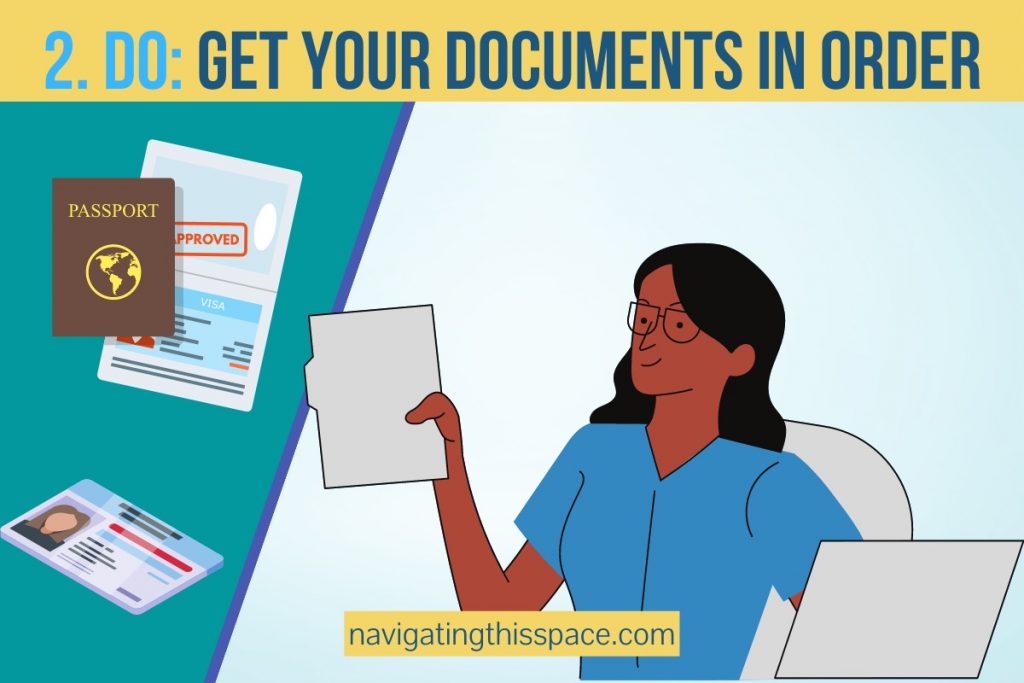
To prevent any unpleasant surprises, start organizing your papers as soon as possible, which means weeks if not months in advance of your departure date.
This includes your passport, visa (if required), tickets, travel insurance, and other important paperwork. Once you have everything, double-check and then triple-check to ensure you haven’t forgotten anything.
The last thing you want to experience when traveling abroad is spending money on a non-refundable ticket without having the proper documentation to board the plane or exit the airport at your destination.
Pro Tip: Make a digital copy of all your important paperwork and save it in a folder on your google drive or somewhere you can easily access that’s password protected, should you misplace your things or get stolen.
3. Do: Pack Light
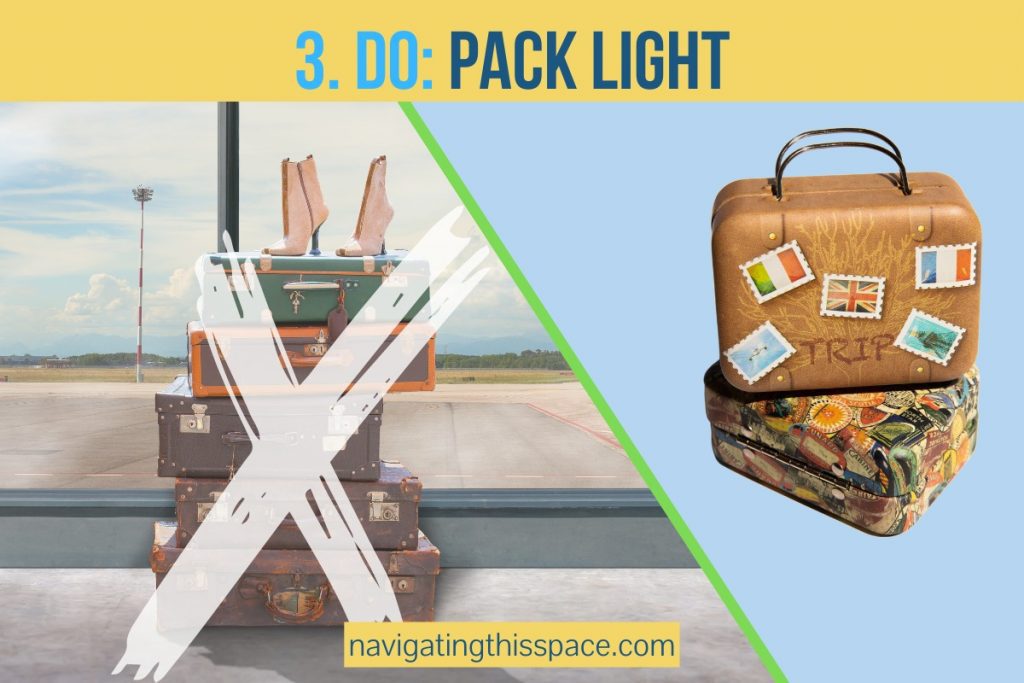
You don’t need to bring your entire wardrobe with you on vacation. The hotel room, hostel, or Airbnb you’ll be staying in will likely have a laundry machine you can use to wash your clothes.
Packing light has several advantages, the main one being avoiding costly baggage fees at the airport.
Other advantages include:
– Having fewer electronic devices and valuable things to keep track of and worry about.
– Moving around more easily, especially if you’re using public transportation
– Avoiding the hassle of lugging around multiple heavy suitcases
Packing light doesn’t mean sacrificing style or comfort; it just means being more mindful about what you’re bringing and only packing the essentials.
This is where doing your research comes in handy. If you know what the weather will be and what’s culturally appropriate to wear, you can use that knowledge as a guide to packing accordingly.
Packing is not complicated. Most of the time, you’ll end up not wearing or using half of the things you thought you couldn’t do without. So save yourself the hassle and pack only what is essential.
Recommended Article: Packing Tips: Things Not Worth Packing When Traveling
4. Do: Ask for Help
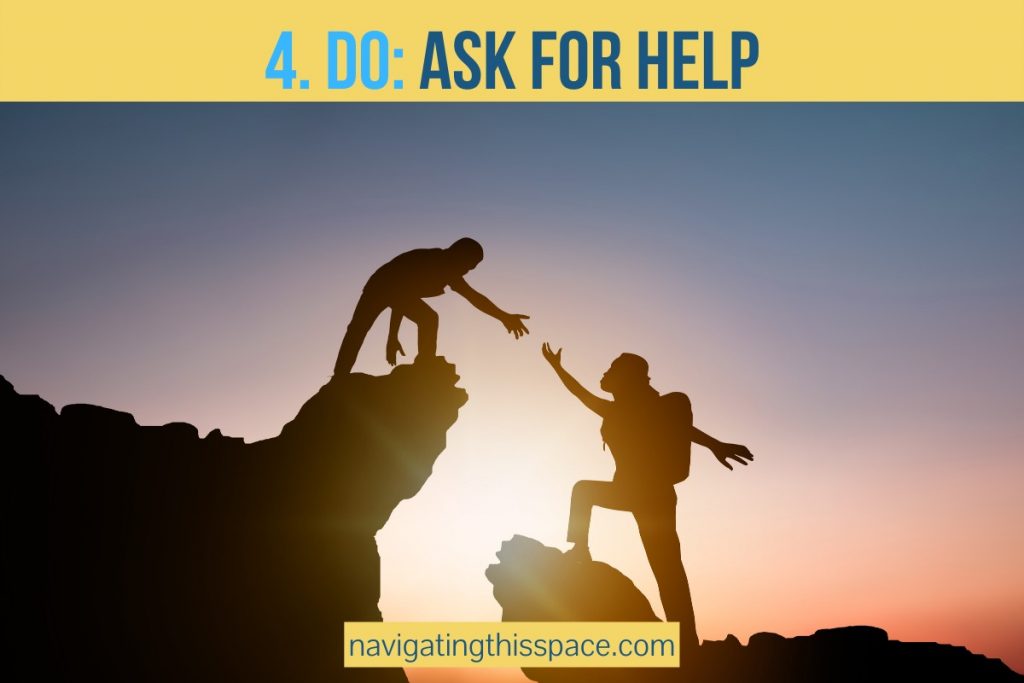
As a new traveler traveling abroad, you may think that the locals won’t be helpful or you need to do everything on your own, so you feel accomplished. However, that’s not the case.
If you need help, don’t be afraid to ask.
The vast majority of people are more than happy to help a foreigner who is obviously trying their best to navigate a foreign land.
All you need to do is be polite and say please and thank you. Also a smile goes a long way. People will feel less threatened if they are being approached with a smile. Remember to keep the smile friendly and not creepy, and you’ll do great.
However, keep in mind that some people may not help you, especially if there’s a language barrier. They may think it’s too difficult to try to explain what you don’t understand. But, in my experience, most people will go out of their way to help a stranger, especially travelers in need.
5. Do: Drink Plenty of Water

Exploring different cultures, sounds, and sites can be exhausting and will take a toll on your body.
Think about it. If you’re not an active walker at home and you visit Rome, where the best experiences require walking everywhere, then you’ll be putting your body through a lot more stress than it’s used to.
It’s vital that you stay hydrated to help the body perform at its best and avoid getting sick or lightheaded.
Carry a reusable water bottle with you and fill it up at every opportunity because you never know when you’ll need it. Reusable water bottles are also great for the environment, so you’ll be reducing plastic waste while you travel.
Recommended Article: 8 Ways to Drink More Water and Stay Hydrated All Day
6. Do: Learn Some Key Phrases

Learning a few key phrases of the foreign country’s local language will help you significantly on your trip.
It gives you a way to communicate with people when there’s a language barrier and shows that you’re making an effort to learn and connect with the culture instead of idly passing through like a zombie.
Approaching a local and greeting them in their language will get you more help than screaming your native tongue at them while expecting them to understand.
Think Chris Rock in the movie Rush Hour screaming, “Do you understand the words that are coming out of my mouth?” Yeah, don’t do that.
Remember you’re the foreigner, and where you’re traveling is that local person’s home. So it’s only polite that you make an effort because that person and every other local are your hosts.
Now that we’ve gone over some things you should do while traveling, let’s move on to the don’ts.
The Don’ts of Traveling for the First Time
1. Don’t Assume Everyone Speaks Your Language

The biggest challenge for travelers is not being able to communicate with the locals. If you don’t know the language, asking for help or finding your way around can be challenging too.
Just because you speak English doesn’t mean everyone does. Even though, according to Statista, English is the most spoken language in the world, it’s rude to assume that everyone you meet knows how to speak it.
Make an effort to learn some key phrases of the local language before going on your trip. It will make a world of difference, and locals will appreciate the effort.
2. Don’t Wait Until the Last Minute to Book

Waiting till the last minute to book your trip can have a lot of negative consequences.
Transportation tickets, especially airline tickets, often sell out fast, and if you wait too long, you may not be able to get a ticket at all. This can cost you more money or cause you to miss out on your trip altogether.
Planning will also help you get better deals on transportation, accommodations, and activities.
The earlier you book, the more likely you will find discounts and promotions. So, don’t procrastinate; spending a little extra time to plan your trip will save you from spending a ridiculous amount of money and frustration in the long run.
3. Don’t Be a Rude Tourist
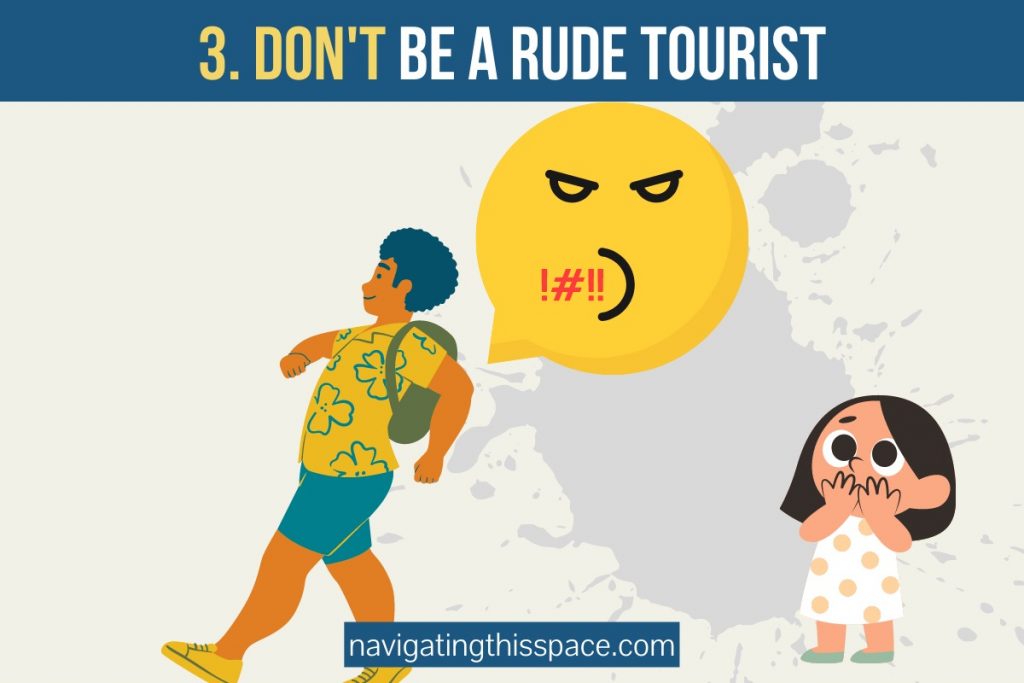
One of the worst things you can do as a tourist is to be rude and intrusive. Just because you’re traveling abroad doesn’t give you the right to be disrespectful to the locals.
Don’t act entitled and think you can do whatever you want because you’re not in your home country.
As I mentioned earlier, you’re the foreigner and where you’re traveling is that local person’s home so it’s only polite that you make an effort.
There’s a big difference between being curious and respectful and being nosy and intrusive.
Respect cultural differences and be mindful of your actions.
For example:
In some cultures, it’s considered rude to show too much skin (Saudi Arabia and Uganda), or show the bottom of your feet (Arab, Muslim, Hindu, and Buddhist countries). In others, it’s considered unlawful to chew gum or connect to another person’s Wi-Fi (Singapore).
Do your research before you go and make sure you know about the local rules for tourists and traditions. That way, you can avoid doing anything that might offend the locals or, worse, break the law.
4. Don’t Be a Target for Crime
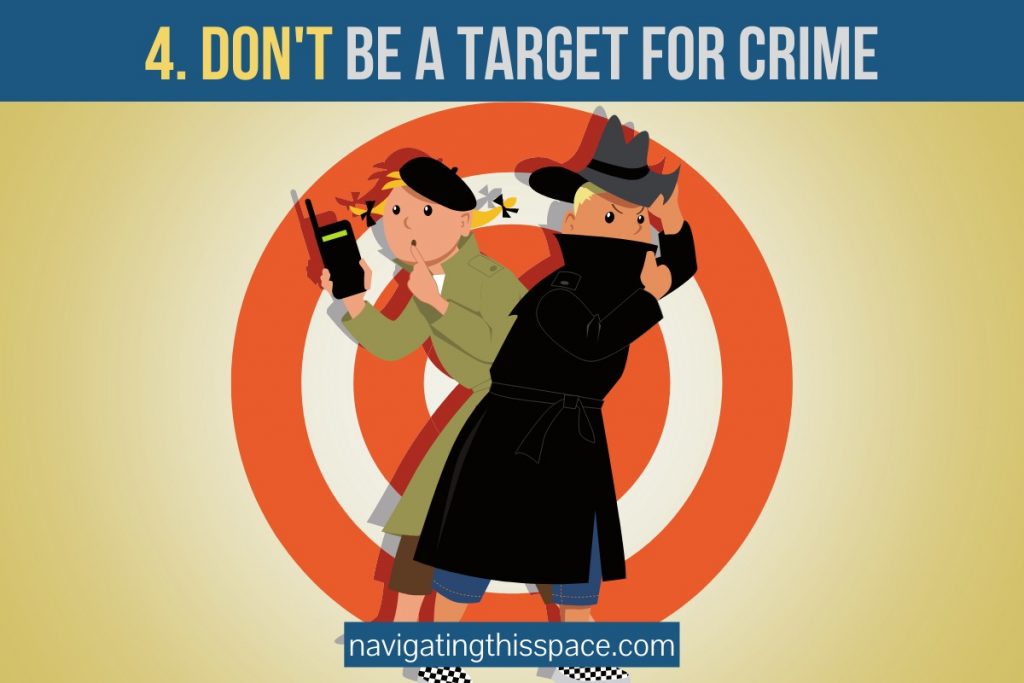
As a traveler, it’s crucial to be aware that you’re more likely to be a target for crime. This is because criminals know tourists usually carry cash and valuables and may not be familiar with their surroundings.
To avoid being a target for crime, it’s important to be aware of your surrounding.
It’s true, you stick out like a sore thumb to locals when you’re traveling, I’ve experienced it in my own home country when I visited, but that doesn’t mean you have to make it easy for criminals.
Don’t walk around with all your valuables in plain sight. Leave your valuables safe in a secure place like a hotel safe or hostel locker.
Carry only the cash you need for the day and keep it hidden in the deepest parts of your bag.
Crowded areas are a target for pickpockets, so try to avoid them if you can. Suppose you can’t, then turn your bag to face forward so you’ll have a visual on it at all times.
Free Wi-Fi can also be a hazard because hackers can use it to access your personal data. So, try to avoid using public Wi-Fi when possible or I recommend using a protection VPN app to help keep your data safe because free Wi-Fi can be a lifesaver.
5. Don’t Overspend While You’re on Vacation

One of the main reasons people travel is to escape from their everyday lives and to relax. Unfortunately, if you’re not careful, you can easily end up spending more money than you intended.
Budgeting is key to avoiding overspending on your trip.
Start by listing all the expenses you’ll need to cover, such as transportation, accommodation, food, and activities.
Once you know how much everything will cost, research different ways to save money.
For example:
Eating at a local restaurant instead of a touristy one, taking public transportation instead of a taxi, or staying in a hostel instead of a hotel.
There are endless ways to save money while you’re on vacation, so doing your research is imperative.
I also recommend setting a daily spending limit for yourself. Once you’ve reached your limit, stop yourself from spending any more money for the day no matter what.
This will help keep your spending in check and ensure you don’t overspend while on vacation.
6. Don’t Forget To Have Fun
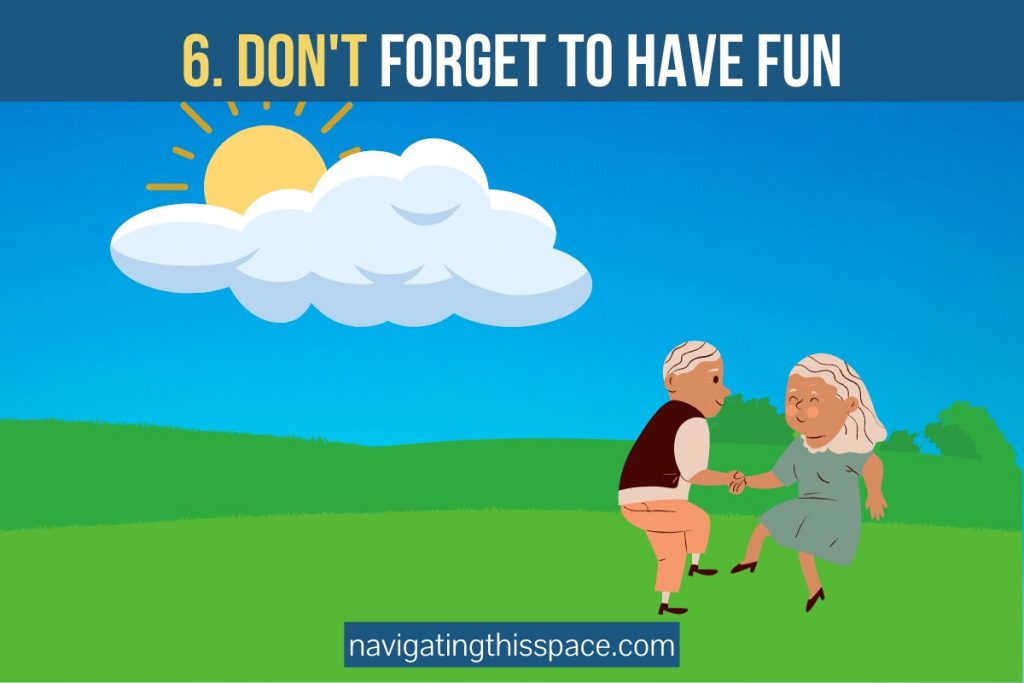
Last but not least, don’t forget to have fun.
This may seem like a no-brainer, but it’s easy to get caught up in the planning and logistics of travel and forget to enjoy yourself.
Travel can be stressful at times, but it’s important to take some time out for yourself and enjoy the experience. After all, you’re on vacation!
There is new food to try, a new location to visit, and new people to meet. Embrace all that travel has to offer and you’re sure to have a great time.
How To Behave When You’re Abroad
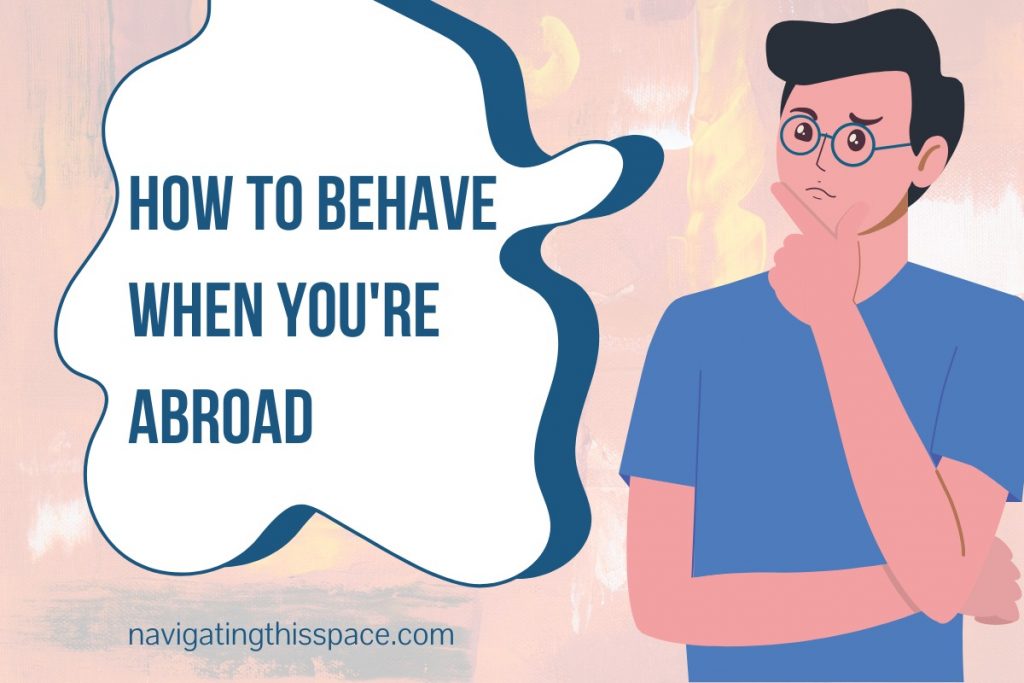
Each country has its own set of customs and traditions that may be unfamiliar to you. However, being respectful of these customs is an important part of being a good traveler.
Americans have a reputation of being the “stupid American” abroad. Don’t be that person. Do your research before you travel to a new country, so you know what to expect and how to behave.
Some common customs include taking your shoes off when you enter someone’s home, not eating with your hands in certain countries, or women covering their heads in others.
Again, it’s important to do your research, so you know what is and isn’t acceptable in the country you’re visiting.
Bottom line, err on the side of caution and be respectful when in doubt. If you make a mistake, apologize and move on. Don’t let it ruin your vacation.
Those are my dos and don’ts of traveling for the first time, the next trip, and all the other trips after that.
By following these tips, you’ll surely have a great traveling experience.
Do you have any other tips for first-time travelers? Share them in the comments below.
Happy travels!
Questions You May Have
What are the dos and don’ts of traveling?
The dos and don’ts of traveling are etiquettes you should adhere to or avoid while traveling. These include being respectful of other cultures, being aware of your surroundings, and not being a menace.
Which are the six common travel problems?
Six common travel problems are overspending, getting lost, inability to communicate, getting sick, being a victim of crime, and having your belongings stolen.
What dangers can tourists face?
Tourists can be targets for crime, which includes pickpocketing or identity theft. They can also fall victim to scams, such as free gifts or low-cost tours, and be exposed to health hazards, such as contaminated food or water.
What problems do tourists face?
Language barriers, delayed flights, lost luggage, and getting sick are some of the main problems tourists face. Other issues include being overcharged, missing out on discounted attractions, and feeling unsafe in a new place.
Pin It!
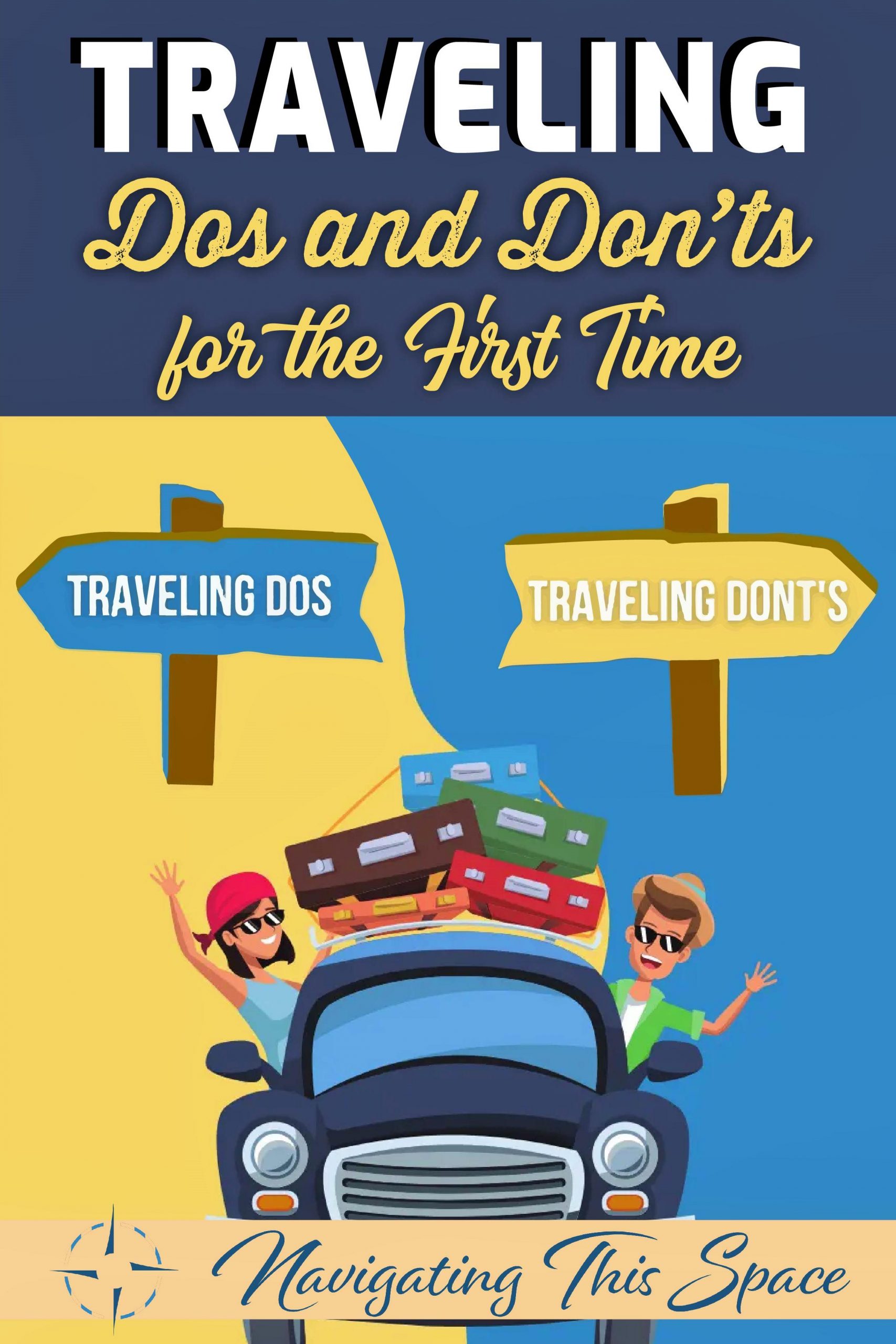

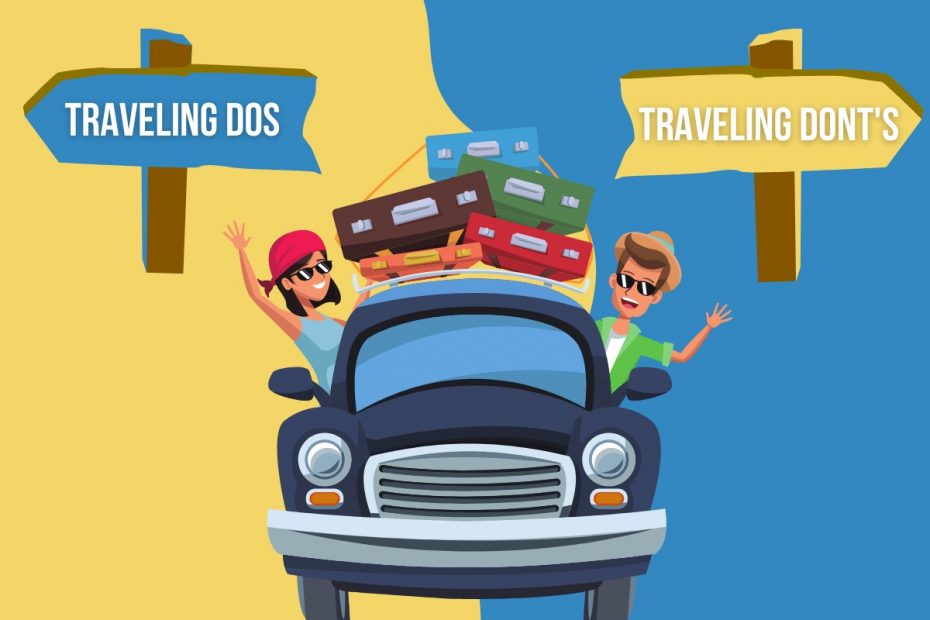


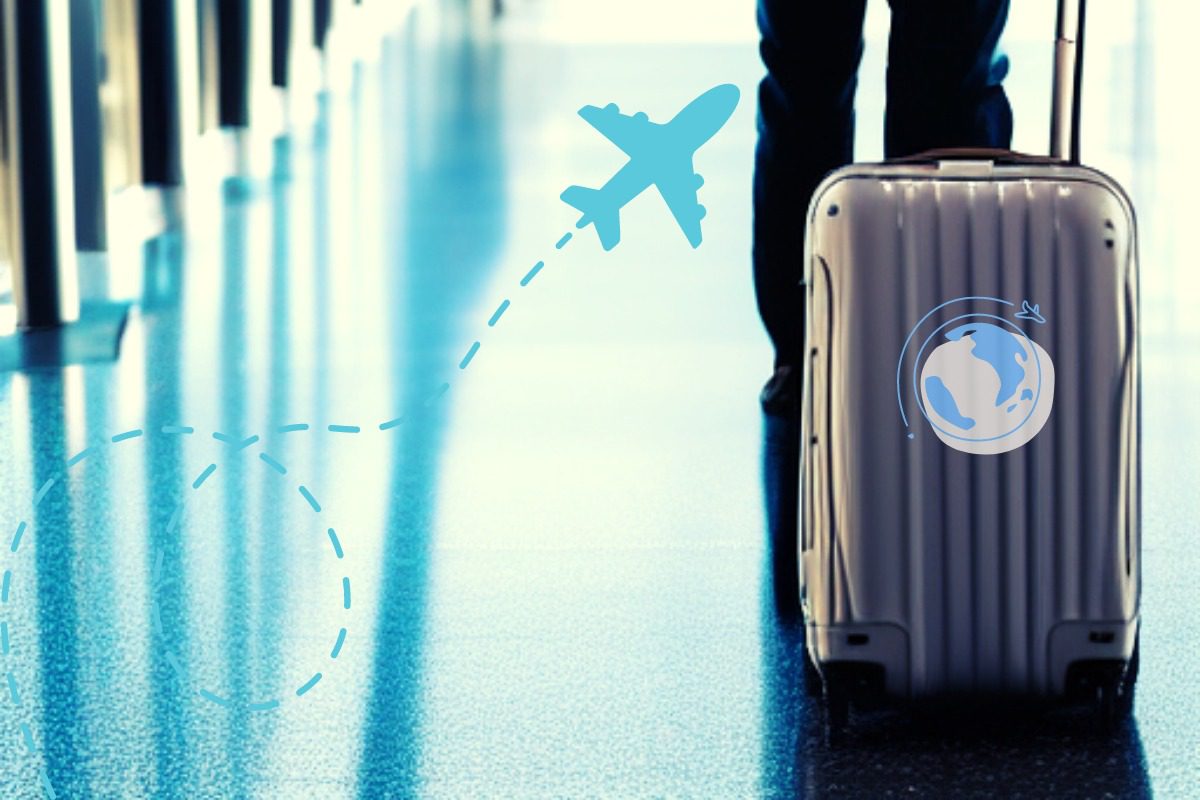
Really liked this!! Even for a person who travels a lot, these are some great tips!! Thanks so much for sharing 😉
You are most welcome Nicolle, thank you for reading!
Great tips for traveling! Good idea doing a do and don’t format. I look forward to reading more articles!
These are awesome tips for travel! Thank you this list will come in handy for me this summer!
Yaas! please share where you do decide to go Hannah! You’ll have tons of fun!
Great tips for first time travelers! Like the way you did it in a do’s and don’ts format. I look forward to reading more articles!